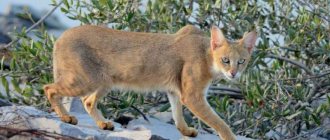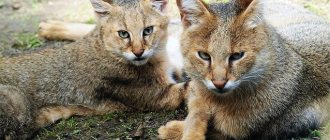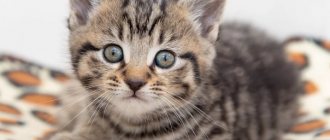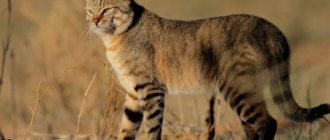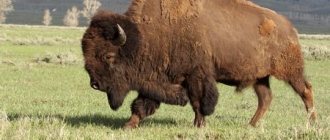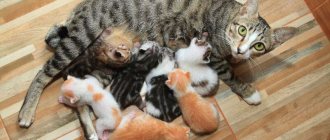Description of the jungle cat
Only at first glance it may seem that the jungle cat is difficult to distinguish from our usual yard leopard. In fact, these are completely different animals, although when crossed with domestic cats, the house produces stable and very interesting hybrids.
This is not some kind of little snow leopard - this is a house cat!
External data
The body length of different subspecies can vary significantly - in the range from 55 to 95 centimeters. At the same time, the tails of all jungle cats are not very expressive: rather thin and short, no longer than a third of the animal’s body. But these cats are well remembered for their piercing gaze of yellow or green eyes and high, sensitive ears. Animals have excellent hearing, which provides them with invaluable assistance when hunting.
The tufts on the ears and the black tip of the tail are the signature markings of a Hausa cat.
By the way, in adult individuals, the ears are necessarily covered with beautiful tassels, like a real lynx - hence the name “swamp lynx”. The height of the ears of some of these small lynxes can reach nine centimeters!
The jungle cat is incredibly graceful, it moves easily and quickly on its strong and long legs, jumps high, runs well, swims and climbs trees. The animal's muscles are in good tone and are superbly developed. Color - all shades of gray in tandem with red. The belly and chin are usually lighter than the upper body, legs and head. The tail of all swamp lynxes has a black tip and several transverse stripes.
Kittens of all subspecies are born striped, but upon reaching adulthood the stripes gradually disappear and remain in only a few individuals.
Baby stripes on the Hausa's coat lighten with age.
The coat is short, with a developed hard spine and a sufficient amount of down. The unique structure of the hair allows it to instantly clean itself and dry after swimming. Pronounced molting allows the cat to change its coat according to the season: in the summer it “wears” hard and short fur, and in winter it wears longer and fluffy fur.
Jungle cat camouflage - photo gallery
Hausa color blends with faded grass
Against the background of trees it is not at all noticeable
The cat also camouflages itself well on rocky paths.
Jaus is not averse to hunting, hiding in the mountains
And yet the reeds are an ideal place for this animal to live.
Particularly large specimens, with good nutrition, can weigh up to twenty kilograms - but this only applies to males, who are always larger than females. Sexual dimorphism among Hausas is quite pronounced.
Video: either a cat or a lynx
Character
Forced to survive in harsh natural conditions, the jungle cat also has a corresponding character. He is very independent, absolutely does not tolerate familiarity or any encroachment on the territory of personal interests. This is a brave, decisive, intelligent and inventive animal, which, however, is ready to make compromises if it sees meaning in life for itself.
The jungle cat is a wise and proud animal
He has the wisdom not to mindlessly get into trouble where there is an opportunity to avoid a dangerous conflict, but he also has the courage - in extreme situations, this brave little beast is selflessly, to the last, ready to defend himself and his offspring.
At times, they surprisingly resemble our beloved domestic cats - they meow almost exactly the same way (only their “voice” is much more sonorous) and can purr loudly. Both wild and domestic cat babies hiss and snort in exactly the same way, trying to muffle their childhood fears. However, an active, playful and inquisitive house is doomed to remain a kitten by nature until old age, and this should definitely be taken into account.
Image and life expectancy
House is a solitary fighting cat who lives on his own and strictly guards the boundaries of his territory from annoying neighbors. These can be very large areas, from fifty to two hundred (!) square kilometers - despite the large habitat, the density of the cat population in it is extremely low.
He leads a twilight lifestyle typical for his family, sleeping a lot during the day to regain strength. He is not only an unsurpassed hunter, but also a skilled fisherman - he dives and swims well in pursuit of prey. Although he prefers fishing in shallow water to such extreme sports, he can wander for a long time on his long legs along the surf, looking for fish or amphibians in the waves.
The jungle cat loves to sleep
This cat loves warmth and is not very well adapted to severe frosts - in cold winters it moves its hunting routes to human farmsteads, stealing poultry from there. In more prosperous times of the year, he is ready to hang out in dense thickets and thorny bushes, just so as not to come into the sight of humans and his other enemies - larger predators, mainly canines: wolves and wild dogs. Jungle cats try, as much as they can, to avoid their “big brothers” - leopards, in those regions of Asia where the ranges of these predators overlap.
The jungle cat is a universal hunter
Such prudence allows the cautious predator to live a considerable life in natural conditions, by the standards of the cat family - up to eleven to twelve years; in conditions of captivity and proper maintenance, its life expectancy can increase.
Nutrition
The jungle cat is a famous gourmet, he knows a lot about tasty and healthy food, and knows how to diversify his diet on his own. The basis of its menu is made up of small rodents, but a medium-sized hare or even young nutria can also provide a hearty lunch for this lucky predator. House loves to catch birds, he does it masterfully and with inspiration - more for the soul than just to simply add to his menu.
Game hunting is an amazing spectacle! Having heard from afar how a careless flock of birds crouched in the thickets, the wild cat concentrates as much as possible on the prey and begins to silently creep up on the prey, merging with its camouflage color with the environment. Precise aim, a lightning-fast high jump, more like a rapid take-off - and now the gaping bird flutters in the sharp teeth of the ideal hunter!
The bog lynx is capable of making breathtaking jumps
The marsh lynx loves fish very much and it is for this reason that it tries to settle close to bodies of water: lakes, rivers and seas, where it can have a good meal. Along the way, the cat will not refuse to try frogs, other amphibians, turtles, lizards and even snakes, even dangerous and very poisonous ones viper
The jungle cat wanders through the water for a long time in search of fish
The animal has an excellent appetite, which largely determines its important role in the ecosystem. Thanks to the jungle cat, an optimal balance of small rodent populations is maintained in its permanent habitat. And the fact that weak, sick or aging animals are the first to fall into the claws of this voracious hunter determines the solution to pressing health issues of ecological balance.
Video: swimmer, fisherman and snake catcher
https://youtube.com/watch?v=OKJUJ1l9Qec
Reproduction
The peak of love passion in the marsh lynx occurs at the end of winter - the beginning of spring. The rut begins in January, when the usually silent and reserved cat announces the surroundings with uterine sounds - thus he announces his intention to get married and warns his rivals that it is better for them to stay away at this important moment.
The jungle cat is much larger than its girlfriend
However, due to their small numbers, bloody duels for the possession of a beautiful lady rarely occur among jungle cats, and issues of procreation for the most part are resolved quite amicably. It is interesting that the males of this species are not devoid of affection for their offspring - they often help their females raise and protect their cubs. Although it is impossible to say that animals form stable pairs for many years.
Pregnancy lasts about two months, after which the fruits of reed love themselves are born - small, helpless kittens, blind, deaf and toothless. Litters are usually not very large - from two to five cubs. They require a lot of attention and care, so the help of a second parent is absolutely useful for a young mother.
Swamp lynx is a very caring mother
By two weeks, kittens become sighted, by three they acquire sharp teeth, and by the age of one month they are able to eat adult food and move independently. From this moment, they begin to actively learn about the world around them and their place in it, first in the form of a game, and then learning in practice. Upon reaching six months, young animals are already able to obtain food for themselves and are completely ready for a further life, independent of their parents. But full sexual maturity in animals of this species develops quite late - only by one and a half years.
The mother thoroughly teaches her cubs the wisdom of survival
Other meanings of this word:
- “...he will tell you the price” (last)
- “...he will tell the price” (proverb)
- "Party" of traders
- "Party" of traders and merchants
- "Filtered" speech
- Where Varvara was deprived of her shoulder
- dialogue between brothers
- the ancient Greeks said: “If you want to know how the people live, visit... and the cemetery”
- Christmas tree…
- You will answer for...!” (criminal phrase)
- what kind of conversation are the brothers filtering?
- What kind of conversation are the brothers filtering?
- mass gathering of traders
- Massive gathering of traders.
- mass gathering of seabirds
- mass gathering of seagulls
- place of possible transformation of a woman into a woman
- Baldy's meeting place with the priest
- meeting place between the priest and Balda
- Location of seagulls
- place for loud women
- retail space on the square
- a place of mass nesting of seabirds on coastal cliffs
- samovar sales place Tsokotukha
- place of work of traders
- Place of work of traders.
- seabird gathering place
- place of curious Varvara's injury
- place of successful purchase of a samovar by Mukha-Tsokotukha
- The place where the curious Varvara lost her most precious
- the place where the curious Varvara was injured
- the place where the curious Varvara suffered
- a place where bargaining is quite appropriate
- a place where bargaining is very appropriate
- set of open air counters
- rock “party” of seagulls
- non-state outlet
- a square in a city or large village to which peasants from surrounding villages gathered on set days to trade with local residents
- Area with counters
- delivery in Odessa
- Bird flock
- Useless conversation
- speech for which they are responsible
- market
- market in Russian
- Market with stalls
- a market where a product is discussed longer than it is sold
- Market, place for trade
- synonym market
- There Varvara's nose was torn off
- something that our economists often confuse with the market
- Bargain
- Trade area
- Trade on the square
- Trade in certain goods at appropriate times (pre-holiday, seasonal, etc.)
- Shopping arcades
- bird's eye shopping center
- Turkic version of the name of the market
- festival "Slavic..."
- buying chips in dominoes and scrabble
- form of trade
- French utopian socialist, follower of Saint-Simon
- Christmas decoration fair
Keeping a jungle cat in captivity
Cases of taming and successfully keeping jungle cats in captivity at home are not as rare as it might seem at first glance - rumors about the animal’s pathological aggressiveness are still wildly exaggerated. But only small kittens are able to fully adapt to living together with humans - the older the animal, the less sense there is in starting the process of taming it.
And we should never forget that genetics cannot be fooled: the jungle cat is not a domestic animal, but a wild animal, and it will remain so, and it is unlikely that you will be able to fashion a “plasticine” leopard from a proud predator, no matter how much you wish.
An adult jungle cat is an established individual; it will not take root in your home.
Features of care
Excellent health and a strong immune system are the undoubted advantages of the swamp lynx and distinguish it favorably from the wild cat Pallas's cat, for which keeping in captivity can be very problematic. In general, caring for a house is not so complicated, although there are important nuances here.
- The jungle cat does not tolerate cramped conditions and boredom - this active animal with enormous potential cannot be locked in a small room; only a spacious room with a large number of toys, cat attractions and other “cures” for idleness is suitable for it.
- Before the age of three months, kittens must be vaccinated twice with a complex vaccine; further vaccination should be repeated every year, not forgetting the rabies vaccination.
- It is no coincidence that the ancient Egyptians used the Hausa for duck hunting - it is indeed a cat dog, which, unlike domestic cats, is quite trainable; but you need to work with him exactly as much as he wishes.
- Buy a leash and collar for your swamp lynx - daily exercise is mandatory for it so that the animal does not fall into depression; At the same time, the house, even as a child, begins to defecate all its cat needs in the litter box without any problems.
- Give him the opportunity to hunt and fish at least sometimes - put a live crucian carp in the bath or buy a safari mouse at the pet store; You yourself wanted to have a wild hunter cat, now be so kind as to keep him in shape.
- Make bathing a mandatory and regular procedure - for the jungle cat this is not only necessary hygiene, but also great pleasure.
- During the period of seasonal molting, an adult animal should be combed daily with a furminator; at all other times, weekly combing is sufficient.
- Dry freeze-dried food is not very suitable for House; raw lean meat plus plant foods (up to a third of the diet) and vitamin and mineral supplements are the basis of his feeding; In order for the digestive system to function normally, live food is also necessary, along with skin or feathers.
- Do not overfeed the jungle cat - in nature it spends much more energy, and in captivity it is prone to obesity; Once a week, give your pet a fasting, fasting day.
Eating too much food is bad for your house if it doesn't move much.
Hybrids
Mating “for love” with ordinary short-haired cats, the House, without knowing it, laid the foundation for a new interesting breed. The initiative was taken up by enterprising breeders - this is how the Chausie, one of the most expensive breeds of domestic cats, appeared. Due to the influx of blood from the Abyssinian breed, the Chausie phenotype was formed more or less completely, and in 2003 the new breed finally received a standard and official recognition.
Chausie is one of the most expensive cat breeds
But breeding these cats is still burdened with problems, and a modest-looking kitten is on par with a good car. Despite this, Chausies are very popular in the country where they were invented, the United States of America, and in Europe the first stage of expansion of a fashionable elite breed mixed with the genes of a wild cat, the Hausa, is just being observed.
The Chausie kitten is a descendant of the jungle cat.
Taming
Do not risk taking an adult animal from its natural environment into your home - coexistence with it will be problematic . But you have a good chance of taming a kitten obtained, for example, from a nest destroyed by someone - such cases, unfortunately, are not uncommon. It’s even better if you get a cub of jungle cats who are no longer in the first generation living in captivity - it will be much easier to find a common language with him.
House, living with a person for several generations, produces more tame offspring
Despite their hyperactivity and willfulness, Hausa kittens can grow into quite manageable and even cute animals, but the owner will have to work hard for this.
- The ideal age for a swamp lynx cub to enter a human home is about a month, when the so-called “reimprinting” is still possible, as a result of which the new owner will replace the baby’s parents and become a guru on all the most important issues of life.
- In order to maintain his authority in good shape and at its best, the owner must pay a lot of attention to his pet: help him explore the world, teach him, play - left to his own devices, the baby will inevitably become bored, wild and mischievous.
- Until the age of two or three months, you will have to put into your head and the life routine of your little house all the basic rules for your living together for the future - kittens are very smart and well trained.
- Try to negotiate with him only in an amicable way, without pressure - jungle cats are touchy and vindictive; but always, by any means, achieve your goal: this wild cat must play by your house rules.
Video: in a good mood
Main problems
If you want, without any special effort, to grow a huge, affectionate purr from a small reed barbarian without any problems, immediately abandon this idea - nothing will come of it. It will take a lot of effort, and there will definitely be problems too . But with desire, perseverance and, of course, great love for your amazing, unique pet, you will definitely cope with all the difficulties. Here's something else to pay attention to:
- The cat must be allowed to “reset” its energy;
- you cannot punish him - only negotiate and switch in a timely manner;
- he gets along well with small domestic animals, but still you shouldn’t leave him alone with a parrot or hamster - you never know what could happen;
- the house does not tolerate the invasion of strangers into its territory - do not try to make friends with your guests;
- During the mating season, an animal can pose a danger to humans, even to its owner.
The jungle cat in the house must be constantly busy with something
Video: cat with character
Guess the riddle:
Mr. Mark was found murdered in his office. The cause turned out to be a bullet wound to the head. Detective Robin, examining the murder scene, found a cassette recorder on the table. And when he turned it on, he heard Mr. Mark's voice. He said: “This is Mark speaking. Jones just called me and said that in ten minutes he would be here to shoot me. There is no use in running. I know this footage will help the police arrest Jones. I hear his footsteps on the stairs. The door opens..." The assistant detective suggested that Jones be arrested on suspicion of murder. But the detective did not follow his assistant's advice. As it turns out, he was right. Jones was not the killer, as was stated on the tape. Question: why did the detective become suspicious? Show answer>>
White bear - towards the pole. Brown bear - through the forest. This one sat on a eucalyptus tree, eats leaves and sleeps a lot. Show answer>>
Teddy bear, Grisha-pinch We were going on a boat. Bear, Grisha drowned. Who's left in the boat? Show answer>>
